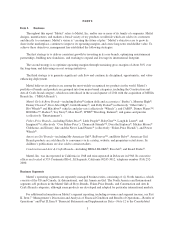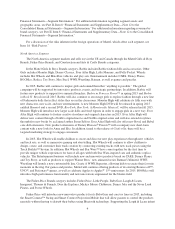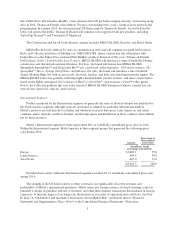Mattel 2014 Annual Report Download - page 12
Download and view the complete annual report
Please find page 12 of the 2014 Mattel annual report below. You can navigate through the pages in the report by either clicking on the pages listed below, or by using the keyword search tool below to find specific information within the annual report.Instruments.” For financial information by geographic area, see Part II, Item 8 “Financial Statements and
Supplementary Data—Note 12 to the Consolidated Financial Statements—Segment Information.”
American Girl Segment
The American Girl segment is a direct marketer, children’s publisher, and retailer best known for its
flagship line of historical dolls, books, and accessories, as well as the My American Girl and Bitty Baby brands.
American Girl also publishes best-selling Advice & Activity books and the award-winning American Girl
magazine. In January 2015, American Girl introduced Grace Thomas™, the 2015 Girl of the Year®doll.
American Girl products are sold in the US and Canada. Beginning in summer 2015, American Girl products will
also be sold in Mexico.
Manufacturing and Materials
Mattel manufactures toy products for all segments in both company-owned facilities and through third-party
manufacturers. Products are also purchased from unrelated entities that design, develop, and manufacture those
products. To provide greater flexibility in the manufacture and delivery of its products, and as part of a
continuing effort to reduce manufacturing costs, Mattel has concentrated production of most of its core products
in company-owned facilities and generally uses third-party manufacturers for the production of non-core
products.
Mattel’s principal manufacturing facilities are located in Canada, China, Indonesia, Malaysia, Mexico, and
Thailand. To help avoid disruption of its product supply due to political instability, civil unrest, economic
instability, changes in government policies or regulations, and other risks, Mattel produces its products in
multiple facilities across multiple countries. Mattel believes that the existing production capacity at its own and
its third-party manufacturers’ facilities is sufficient to handle expected volume in the foreseeable future. See
Item 1A “Risk Factors.”
Mattel bases its production schedules for toy products on customer orders and forecasts, taking into account
historical trends, results of market research, and current market information. Actual shipments of products
ordered and order cancellation rates are affected by consumer acceptance of product lines, strength of competing
products, marketing strategies of retailers, changes in buying patterns of both retailers and consumers, and
overall economic conditions. Unexpected changes in these factors could result in a lack of product availability or
excess inventory in a particular product line.
The majority of Mattel’s raw materials are available from numerous suppliers but may be subject to
fluctuations in price.
Competition and Industry Background
Mattel is a worldwide leader in the manufacture, marketing, and sale of toys. Competition in the toy
industry is based primarily on quality, play value, and price. Mattel offers a diverse range of products for
children of all ages and families that include, among others, toys for infants and preschoolers, girls’ toys, boys’
toys, youth electronics, hand-held and other games, puzzles, educational toys, media-driven products, and
fashion-related toys. The North America segment competes with several large toy companies, including Bandai,
Hasbro, Jakks Pacific, Leap Frog, Lego, MGA Entertainment, Spin Master, Tomy, and VTech, many smaller toy
companies, and several manufacturers of video games and consumer electronics. The International segment
competes with global toy companies including Bandai, Hasbro, Lego, MGA Entertainment, Playmobil, Tomy,
and VTech, other national and regional toy companies, and manufacturers of video games and consumer
electronics. Foreign regions may include competitors that are strong in a particular toy line or geographical area
but do not compete with Mattel or other international toy companies worldwide. The American Girl segment
competes with companies that manufacture girls’ toys and with children’s book publishers and retailers.
6
























